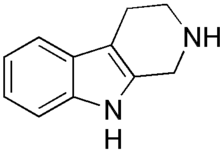Tryptoline
Tryptoline, also known as tetrahydro-β-carboline and tetrahydronorharmane, is a natural organic derivative of beta-carboline. It is an alkaloid chemically related to tryptamines. Derivatives of tryptoline have a variety of pharmacological properties and are known collectively as tryptolines.
 | |
| Names | |
|---|---|
| IUPAC name
1,2,3,4-Tetrahydro-9H-pyrido[3,4-b]indole | |
| Other names
Noreleagnine Tetrahydronorharman 2,3,4,9-Tetrahydro-1H-β-carboline | |
| Identifiers | |
3D model (JSmol) |
|
| ChEMBL | |
| ChemSpider | |
| ECHA InfoCard | 100.156.194 |
PubChem CID |
|
| UNII | |
CompTox Dashboard (EPA) |
|
| |
| |
| Properties | |
| C11H12N2 | |
| Molar mass | 172.226 g/mol |
Except where otherwise noted, data are given for materials in their standard state (at 25 °C [77 °F], 100 kPa). | |
| Infobox references | |
Pharmacology
Many tryptolines are competitive selective inhibitors of the enzyme monoamine oxidase type A (MAO-A). 5-Hydroxytryptoline and 5-methoxytryptoline (pinoline) are the most active monoamine oxidase inhibitors (MAOIs) with IC50s of 0.5 μM and 1.5 μM respectively, using 5-hydroxytryptamine (serotonin) as substrate.
Tryptolines are also potent reuptake inhibitors of serotonin and epinephrine, with a significantly greater selectivity for serotonin. Comparison of the inhibition kinetics of tetrahydro-β-carbolines for serotonin and epinephrine reuptake to that of the platelet aggregation response to these amines has shown that 5-hydroxymethtryptoline, methtryptoline, and tryptoline are poor inhibitors of reuptake. In all respects 5-hydroxytryptoline and 5-methoxytryptoline showed greater pharmacological activity than the tryptoline and methtryptoline.
Although the in vivo formation of tryptolines has been a matter of controversy, they have profound pharmacological activity.
See also
References
- H. Rommelspacher; H. Kauffmann; C. Heyck Cohnitz; H. Coper (1977). "Pharmacological properties of tetrahydronorharmane (Tryptoline)". Journal Naunyn-Schmiedeberg's Archives of Pharmacology. 298 (2): 83–91. doi:10.1007/BF00508615.